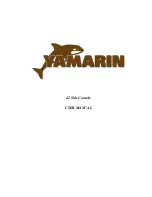
Always monitor the oil level in the remote tanks before
each cruise by checking the gauge or indictor lights in
the helm (not available on all engine installations) or
visually checking the oil level using the reference marks
on the tanks.
When additional oil is needed, use only the type of oil
specified by the engine manufacturer. Refer to the
engine owner’s manual for oil specifications and
additional information on the oil injection system.
Note: Always monitor the oil level in the tanks
and only use the type of oil specified by
the engine manufacturer.
4-cycle outboard engines have an oil sump in the
crankcase that must be kept full of the type and grade of
oil recommended by the engine manufacturer. It is
normal for 4-cycle engines to consume a small amount of
oil. Therefore, the oil must be checked before each use
and changed at regular intervals as instructed by the
engine owner’s manual. As with 2-cycle engines, use only
the type of oil specified by the engine manufacturer.
1.4 Engine Cooling System
Outboard engines are raw water (seawater) cooled.
Water is pumped through the water inlets, circulated
through the engine block, and relinquished with the
exhaust gases through the propeller hub. The pump uses
a small impeller made of synthetic rubber. The impeller
and water pump cannot run dry for more than e few
seconds. In most outboard motors, some cooling water is
diverted through ports below the engine cowling. This
allows the operator to visually check the operation of the
cooling system. When the engine is started, always
check for a steady stream of water coming out of those
ports.
Note: If the boat is used in salt or badly
polluted water, the engines should be
flushed after each use. Refer to the
engine owner’s manual for the proper
engine flushing procedure.
1.5 Propellers
The propellers convert the engine’s power into thrust.
They come in a variety of styles, diameters and
pitches. The one that will best suit the needs of your
Wellcraft will depend somewhat on your application
and expected average load. Propeller sizes are
identified by two numbers stamped on the prop in
sequence. The 1
st
number in the sequence (example
14 x 21) is the diameter of the propeller, and the 2
nd
number is the pitch. Pitch is the theoretical forward
distance traveled by the boat in each revolution of the
propeller.
Always repair or replace a propeller immediately if it
has been damaged. A damaged and therefore out of
balance propeller can cause vibration that can be felt
in the boat and could damage the engine gear
assembly. Refer to the engine owner’s manual for
information on propeller removal and installation.
21
Summary of Contents for 232 Coastal
Page 1: ...232 252 Coastal OWNER S MANUAL Wellcraft Marine Corp 1651 Whitfield Ave Sarasota FL 34243...
Page 2: ...2...
Page 4: ...4...
Page 7: ...232 COASTAL SPECIFICATIONS 7...
Page 8: ...252 COASTAL SPECIFICATIONS 8...
Page 16: ...16...
Page 43: ...232 COASTAL SAFETY LABELS 2601 1124 2601 1094 43...
Page 44: ...252 COASTAL SAFETY LABELS 2601 1124 2601 1094 44...
Page 45: ...232 252 COASTAL CAPACITY LABELS 45...
Page 64: ...Appendix A SCHEMATICS 232 COASTAL INSTRUMENT PANEL 64...
Page 65: ...Appendix A SCHEMATICS 232 COASTAL HELM SWITCH PANEL 65...
Page 66: ...Appendix A SCHEMATICS 232 COASTAL BREAKER BOX PANEL 66...
Page 67: ...Appendix A SCHEMATICS 232 COASTAL WIRING HARNESS 67...
Page 68: ...Appendix A SCHEMATICS 252 COASTAL INSTRUMENT PANEL 68...
Page 69: ...Appendix A SCHEMATICS 252 COASTAL HELM SWITCH PANEL 69...
Page 70: ...Appendix A SCHEMATICS 252 COASTAL BATTERY SWITCH PANEL 70...
Page 71: ...Appendix A SCHEMATICS 252 COASTAL WIRING HARNESS 71...
Page 76: ...Appendix A 232 COASTAL OVERHEAD LAYOUT 76...
Page 77: ...Appendix A 252 COASTAL OVERHEAD LAYOUT 77...
Page 78: ...Appendix A SCHEMATICS 232 COASTAL TRAILER SCHEMATIC 78...
Page 79: ...Appendix A SCHEMATICS 252 COASTAL TRAILER SCHEMATIC 79...
Page 83: ...MAINTENANCE LOG 83...
Page 84: ...MAINTENANCE LOG 84...
Page 86: ...Appendix D BOAT ACCIDENT REPORT 86...
Page 87: ...87...
Page 93: ...Appendix F TROUBLESHOOTING GUIDE 93...
Page 94: ...TROUBLESHOOTING GUIDE 94...
Page 95: ...TROUBLESHOOTING GUIDE 95...
Page 96: ...TROUBLESHOOTING GUIDE 96...
Page 97: ...TROUBLESHOOTING GUIDE 97...
















































